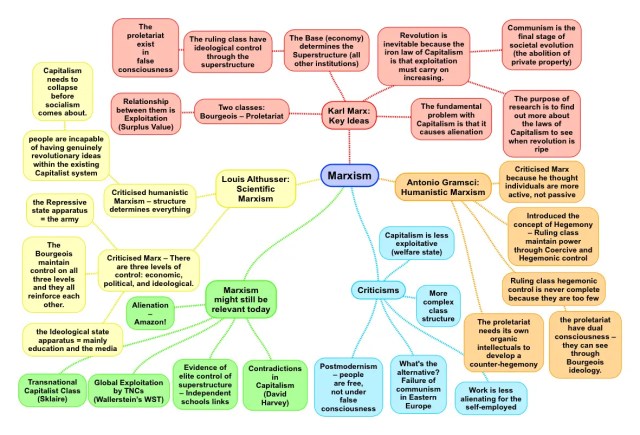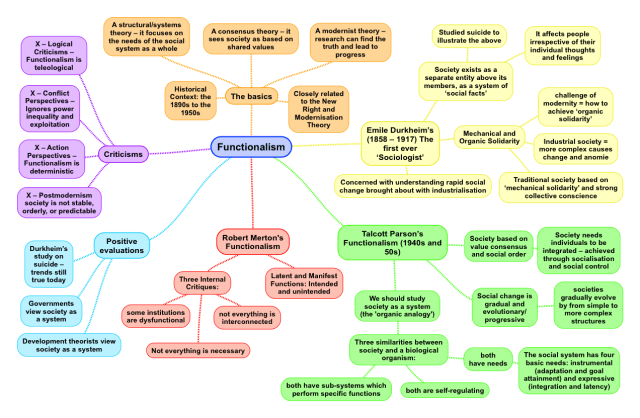What reading should you do in order to prepare for studying an undergraduate degree in Sociology? This post recommends some introductory reading that you might like to do over the summer to get ahead before commencing the first year of your degree in sociology, or related discipline.
I also explore some of the differences between A-level and degree level sociology at the end of the post…
Good introductory text books for studying an undergraduate degree in sociology
You should read at least the introductory chapter to one of the text books below (preferably the one recommended by the university you most want to go to), to give yourself an idea of the core themes in degree level Sociology.
- Giddens (2013) Sociology
- Online summary of the above
- Fulcher and Scott (2011) Sociology
- Cohen and Kennedy: Global Sociology (2013)
- Web site for the above(might be a bit heavy going)
- Haralambos and Holborn (2013) Sociology Themes and Perspectives – The section on Globalisation and Late Modern theories are especially good.
Actual books to read – written by Sociologists
The two books below are on Globalisation, one of the most important concepts which Sociology deals with, and they are written by two of the leading Sociologists in the world today, at least they were until Bauman died in January 2017 (RIP!)
- Giddens (2002) Runaway World (Kindle edition is less than £4)
- Bauman (2007): Liquid Times: Living in an Age of Uncertainty
Podcasts/ Videos and blogs – to you keep up to date with contemporary sociology
You won’t be able to keep up with everything, so for the area of Sociology you are most interested in – search for that topic on any of the forums below…
- ‘Thinking Allowed’ on Radio 4 – This is a weekly 30 minute sociology Podcast, which typically covers two pieces of research from two different Sociologists. Their archive is excellent.
- ‘TED’ talks are interdisciplinary but there is a lot of Sociology in here if you search – TED talks are 20 minutes long, but you can nearly always skip the first few minutes. NB – The most popular TED talk is Ken Robinson’s ‘How Schools Kill Creativity’
- The London School of Economics blog is more specifically political/ economic/ sociological than either of the above sites, but has some good updates on Sociological research.
The University of Bristol’s Recommended Reading List
Bristol is ranked number two for sociology in the U.K. Below I reproduce the University of Bristol’s recommended introductory reading list for its various core introductory courses for 2018, which are the bold headings below.
The Sociological Imagination
- Z Bauman and T May, 2001, Thinking Sociologically, Oxford: Blackwell.
- R Jenkins, 2002, Foundations of Sociology, Basingstoke: Palgrave MacMillan.
- N Abercrombie, 2004, Sociology, Cambridge: Polity.
Key Social Thinkers
- Calhoun, C., Classical Sociological Theory
- Craib, I., Classical Social Theory
- Fevre, R., and Bancroft, A., Dead White Men and Other Important People: sociology’s big ideas
- Giddens, A., Capitalism And Modern Social Theory
- McIntosh, I., Classical Sociological Theory: a reader
- McLennan., G. Story of Sociology
- Ritzer, G., Classical ‘Sociological Theory
Social Inequalities and Divisions
- Geoff Payne (ed), 2000, Social Divisions Basingstoke: Palgrave
- Harriet Bradley, 1996, Fractured Identities Cambridge: Polity
- Fiona Devine and Mary Waters (eds), 2004, Social Inequalities in Comparative Perspective Oxford: Blackwell
- Shaun Best, 2005, Understanding Social Divisions London: Sage
- Wendy Bottero, 2000, Stratification London: Routledge
Sociology in Global Context
- Castles, Stephen, and Miller, Mark J. 2009. The Age of Migration: International Population Movements in the Modern World. Basingstoke: Palgrave Macmillan.
- Cohen, Robin, and Kennedy, Paul. 2007. Global Sociology. Basingstoke: Palgrave Macmillan.
- Lash, Scott, and Lury, Celia. 2007. Global Culture Industries: The Mediation of Things. Cambridge: Polity Press.
- Martell, Luke. 2010. The Sociology of Globalization. Cambridge: Polity Press.
- Massey, Douglas S., Arango, Joaquin, and Hugo, Graeme. 2005. Worlds in Motion: Understanding International Migration at the End of the Millennium. Oxford: Oxford University Press.
An Introduction to the Sociology of Culture
- Bennett, A. (2005) Culture and Everyday Life London: Sage Publications
- Gray, A. and Mc Guigan, J. (eds) Studying Culture: an Introductory Reader London: Edward Arnold.
- Hesmondhalgh, D. (2007) The Cultural Industries (second edition) London: Sage Publications.
- Jenkins, H. (2006) Convergence Culture: Where Old and New Media Collide New York University Press
- Strinati, D. (2004) An Introduction to Theories of Popular Culture (second edition) London: Routledge.
Research Methods
- Devine, F., Heath, S. (1999) Sociological Research Methods in Context. London: Palgrave Macmillan.
- Gilbert, N. (ed.) (2001) Researching Social Life (2nd edition). London: Sage.
- May, T. (2001) Social Research. Issues, Methods and Process (3rd Edition). Maidenhead: Open University Press.
- Robson, C. (2002) Real World Research (2nd Edition). Oxford: Blackwell.
- Ruane, J.M. (2005) Essentials of Research Methods. Oxford: Blackwell.
- Seale C.F. (ed.) (2004) (2nd edition) Researching Society and Culture. London: Sage.
What’s the difference between studying sociology at ‘A’ Level and studying sociology at ‘degree’ level?
- In terms of content – Sociology is a lot more diverse at degree level than at ‘A’ Level – Sociologists research very diverse topics and universities have more freedom to set the modules which they teach than at A level. Degree content will thus vary with the specialisms of the staff, and varies enormously from university to university – some universities will be more focused on politics and social policy, and others more on the media and the study of culture, for example.
- Sociology lot more interdisciplinary at degree level– there is a lot more overlap between Sociology and other subjects such as Anthropology, Development Studies, Criminology, Psychology, and Social Policy. Most students studying Sociology actually combine it with something else.
- You will need to do a lot more in-depth reading at degree level (this is the case in any social science, or humanities subject). You will typically need to read a minimum of one chapter from a book and one or two other sources which relate to this core reading. In total, this will mean at least 40 pages of reading per module per week, and you will probably be studying 4 modules at a time – so that means 160 pages per week – and you’ll need to add on more for the essays you’ll be doing.
- You will need to know the knowledge in much more depth at degree level – you will be expected to read and summarise extracts of core-texts each week and be able to critically evaluate these texts in discussion and essays.
- In terms of skills – you need show greater depth of critical awareness, analysis and evaluation, and be able to demonstrate all of these verbally and in writing, using evidence.
- You need to more self-starting in terms of reading and writing essays – there is a lot less contact time at university.
- Although your options in Sociology will vary enormously from uni to uni, pretty much all degree-courses will have compulsory modules in the following
Common Themes in most Sociology Degree Courses
- Research Methods
- Social Theory – Classical and Contemporary
You will also find options in the following areas in most university departments:
- Globalisation
- Identity
- Gender
- Dissertation option (which will be restricted by staff interests)
Two examples of Sociology departments to start you off
- The University of Surrey – useful to know because it has reading lists attached to its courses (many universities don’t have these publically available)
- The London School of Economics – useful to know even if you aren’t likely to get the grades due to its excellent public lecture programme and various blogs.
NB – There are another 99 universities which offer Sociology in the UK



